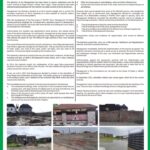By Sylvester Ataomaji
The 13% DERIVATIVE fund hitting Kogi State can at best provide a logical explanation for the sudden flippant, decadent, immoral, shameless, and profligate expenditure profile of the outgoing administration. While it has become expedient to speak out and invite the Presidency and other relevant antigraft bodies to deepen and sustain their eagle-eye watch on Kogi’s last-minute do-good projects and programs initiation, Kogites, and well-meaning nationals must advise the incumbent administration for restraint by sounding the necessary alarm NOW!
Kogi State is generously ascribed with an over-the-top endowment with abundant natural resources aside from its oil reserves, making it one of the most resource-rich states in the North Central zone and Nigeria as a whole. However, the state has been plagued by poor governance, corruption, resource pilferage, and low Human Development Indices (HDIs), as highlighted in the World Bank’s 1999 poverty reduction intervention project appraisal document. These issues have severely hindered the overall development of the state and its people. In 2022, Kogi State was approved as one of the oil-producing states in Nigeria, qualifying it to receive a 13% derivative fund aimed at mitigating the negative impacts of oil production and fostering development in the host communities. However, the current administration has been slow in establishing the necessary statutory organs for administering the fund, thus dampening the hopes and expectations of the host communities. Consequently, the host communities continue to face poverty, lack of infrastructure such as roads and clean drinking water, and homelessness for a vast majority of the community members as the result of frequent displacement due to annual flooding. Many are astounded that CSOs, scholars, and the Ibaji intelligentsia are not responding to the emerging resource curse scenario in Kogi State, despite the failure of the older beneficiaries of the 13% derivative fund in Nigeria by focusing on the impact of oil production on development and governance on the Ibaji people, especially.
To understand this seemingly muted conversation in Kogi State due to the current tense political climate, we, first of all, must address our minds to the Concept of the Resource Curse addresses the paradoxical situation where countries or regions rich in natural resources experience slower economic growth, increased poverty, and governance challenges. This occurs due to factors such as over-reliance on resource exports, corruption, mismanagement of revenues, and socio-economic inequalities.
Globally, many resource-rich countries have faced challenges in effectively managing their natural resources to achieve sustainable development. These challenges include governance issues, environmental degradation, economic volatility, and social unrest. In Nigeria, efforts have been made to address the resource curse, but progress has been slow, with corruption and mismanagement persisting.
In Kogi State, the delayed establishment of the statutory organs as an Oil-producing State and administering the 13% derivative fund recently came under public scrutiny as Yahaya Bello’s handling of the fund and overall Kogi Oil-producing State status conversation. While many have flown the kite of fraud, others have insisted that the fund is been applied to non-host communities-related items that must urgently be investigated and stopped so as not to set a dangerous precedent as the goose laying the golden egg represented by the oil-producing communities and Ibaji LGA in particular which in the sought opinion of the people, has negatively affected the development of the oil-producing communities in the East Senatorial zone of Kogi State. As a result, the host communities continue to experience poverty, inadequate infrastructure, and frequent displacement due to flooding.
In Kogi state like the broad Nigerian scene, the impact of the resource curse concept has been very phenomenal. Since inheriting the victory from several decades of community-government struggle, the administration has progressively diverted attention from the Oil producing State status to enable the perfection of sinister, debilitating, and anti-progressive moves against the actual beneficiaries and escalating such questions as:
How has the delay in establishing the statutory organs for administering the 13% derivative fund affected the development of oil-producing communities in Kogi State?
What are the specific challenges faced by the host communities in terms of poverty, infrastructure, and displacement?
How does the emerging resource curse impact governance and resource management in Kogi State?
What potential strategies can mitigate the negative impacts of oil production and promote sustainable development in Kogi State’s oil-producing communities and the state in general?
Dear compatriots, the impending November 11, 2023, Governorship Election in Kogi State and the reprehensible and dishonorable desire to perpetuate the present administration only suggest attempts by the incumbent at covering up and molesting the collective psyche of the good people of Kogi State to interrogate:
The delayed establishment of the statutory organs for administering the 13% derivative fund and why the administration is hindering the development opportunities for oil-producing communities in Kogi State.
The emerging and desperate introduction of the resource curse concept in Kogi State and how it will contribute to poor governance and heightened mismanagement of resources.
The flagrant and arrogant refusal to Improve resource management and target interventions to mitigate the negative impacts of oil production and promote development in Kogi State’s oil-producing communities.
Refocusing attention from the man-made and tensed electioneering season and the run-up to the November 11, 2023 election to the resource curse phenomenon and its handling by the administration, will beam a lot more light on this critical path by examining its emerging scenario in Kogi State. The attendant issues will logically put pressure on the administration for accountable and transparent governance for posterity.
Another significant importance for good attention on Kogi’s new Oil-producing state status and the administration’s expenditure profiling is its contribution to the existing knowledge on the resource curse phenomenon by examining its emerging scenario in Kogi State. The searchlight will provide insights into the specific challenges faced by oil-producing communities in terms of poverty, infrastructure, and displacement as existential threats. This motley attention will identify strategies and interventions to mitigate the negative impacts of governance, politics, and oil production and promote sustainable development. Ultimately, these non-state actors working with the communities can inform policymakers, government agencies, and development organizations in implementing effective measures to address the resource curse and improve the well-being of the host communities in Kogi State.
-Sylvester Ataomaji writes from Ujeh, Ibaji Local Government Area.















